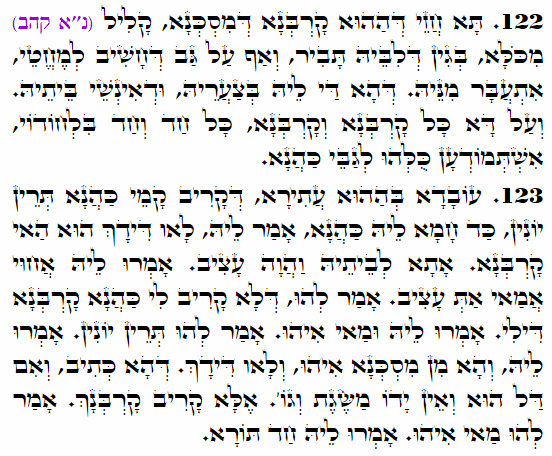Daily Zohar # 3889 – Vayikra – Would you bring two pigeons or a bull?
Daily Zohar 3889

Hebrew translation:
123. מַעֲשֶׂה בְאוֹתוֹ עָשִׁיר שֶׁהִקְרִיב לִפְנֵי הַכֹּהֵן שְׁנֵי יוֹנִים. כְּשֶׁרָאָה אוֹתוֹ הַכֹּהֵן, אָמַר לוֹ, הַקָּרְבָּן הַזֶּה אֵינוֹ שֶׁלְּךָ. הָלַךְ לְבֵיתוֹ וְהָיָה עָצוּב. אָמְרוּ לוֹ אֶחָיו, לָמָּה אַתָּה עָצוּב? אָמַר לָהֶם, שֶׁהַכֹּהֵן לֹא הִקְרִיב אֶת קָרְבָּנִי. אָמְרוּ לוֹ, וּמַה הוּא? אָמַר לָהֶם, שְׁנֵי יוֹנִים. אָמְרוּ לוֹ, וַהֲרֵי זֶה שֶׁל עָנִי, וְלֹא שֶׁלְּךָ! שֶׁהֲרֵי כָּתוּב, וְאִם דַּל הוּא וְאֵין יָדוֹ מַשֶּׂגֶת וְגוֹ’, אֶלָּא הַקְרֵב קָרְבָּנְךָ. אָמַר לָהֶם, וּמַה הוּא? אָמְרוּ לוֹ, שׁוֹר אֶחָד.
.
Zohar Vayikra
Continued from previous DZ
#122
The offering of the poor person is simple, because his heart is broken, and even when he thinks of doing a sin, the sin is cleared from him, because of his pain and the sorrow of his family. The priest knows the value of every individual offering.
#123
There is a story about a rich man that brought two turtledoves as an offering to the priest but the priest rejected it saying that it is not his offering. He returned back to his home and was very sad. His brothers asked him why he was sad, and he told them that the priest didn’t accept his offering of two turtledoves. They told him that this type of offer is accepted by poor people, not from him as it is written;
Leviticus 14:21
“וְאִם דַּל הוּא וְאֵין יָדוֹ מַשֶּׂגֶת וְלָקַח כֶּבֶשׂ אֶחָד אָשָׁם לִתְנוּפָה לְכַפֵּר עָלָיו וְעִשָּׂרוֹן סֹלֶת אֶחָד בָּלוּל בַּשֶּׁמֶן לְמִנְחָה וְלֹג שָׁמֶן.”
“וּשְׁתֵּי תֹרִים אוֹ שְׁנֵי בְּנֵי יוֹנָה אֲשֶׁר תַּשִּׂיג יָדוֹ וְהָיָה אֶחָד חַטָּאת וְהָאֶחָד עֹלָה.”
“But if he is poor and cannot afford it, then he shall take one male lamb as a trespass offering to be waved, to make atonement for him, one-tenth of an ephah of fine flour mixed with oil as a grain offering, a log of oil,”
“and two turtledoves or two young pigeons, such as he is able to afford: one shall be a sin offering and the other a burnt offering.”
His brothers told him that according to his level, he can afford to bring one bull to the priest.
Lesson;
The Torah teaches us that the correction for our sins should be painful on the personal level so it will remind us to not repeat it.
The priest knew that the cost of two pigeons would not have a lasting impact on the rich man, so he rejected the offering.
Bringing offerings to the priest was made in public, so the people could see if the offering was proper.
If a person hurts another person in public, he should correct it in public. Apologizing in person away from public eyes is not sufficient to make the correction because it wasn’t done on the same level of exposure. Even if the apology is accepted, the correction would still be pending until it is resolved.
To correct past situations, we can contact the person, ask for forgiveness, and find ways to compensate them. If that person is no longer alive or not found then there is a process that is done in front of ten people by the burial place of the person. Another way that could help is to give Tzedakah on behalf of the person. We mediate that the merits of the Tzedakah would benefit them, and B’li Neder, we will never cause such harm or pain to other people.
{||}

 Previous: Vayikra
Previous: Vayikra

